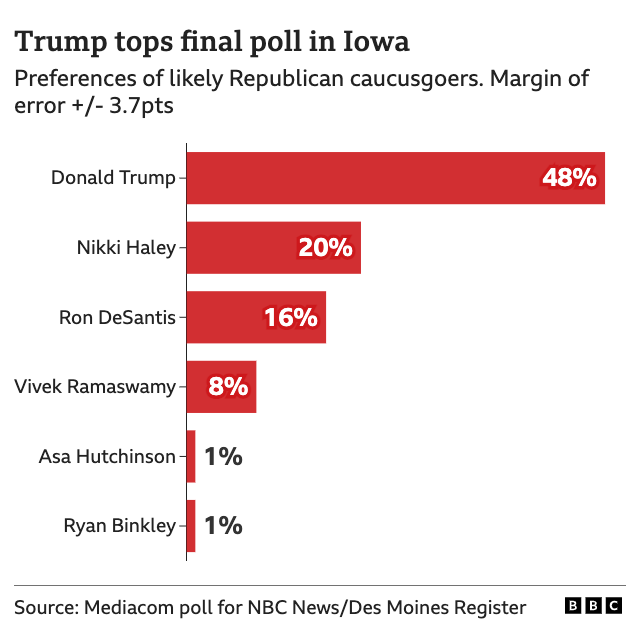The field has winnowed considerably over recent months, but one thing has remained constant. Former president Donald Trump continues to tower over his party’s future, despite the best efforts of his rivals.
That’s why so much of the drama in the build-up to the Iowa caucuses has been focused on snow accumulations and how far the wind chill will drop, rather than who may emerge victorious.
But there are still key storylines that will develop as the Monday night’s results come in.
Trump’s knockout punch
Unless there is a dramatic polling error, Donald Trump is going to win the Iowa caucuses.
He has broad and enthusiastic support among Republicans voters in the state and a ground organisation that is significantly more sophisticated than the shoestring team that delivered a second-place finish behind Texas Senator Ted Cruz in 2016.
- What is a caucus? Why is Iowa important?
- A very quick guide to US Republican primaries
- Follow live updates
What the former president and his team are looking for in the state is more than just a win. They want the kind of crushing victory that they hope removes all doubt that Mr Trump will be the party’s nominee at the Republican national convention this July.

A true knockout punch may not be possible, as Iowa historically has only reduced the field, not crowned the ultimate nominee. But with Mr Trump essentially campaigning as an incumbent president, denying that he was even defeated in 2020, this is no typical year.
A coveted second place
If Mr Trump’s dominating poll position proves to be an accurate reflection of Iowa Republican voter mood, the real battle in the state is for second place.
Last Wednesday’s acrimonious two-person debate between Florida Governor Ron DeSantis and former UN Ambassador Nikki Haley put the high stakes here in stark relief. If one of these two opens some daylight between the other in the final Iowa results, it could elevate that candidate as the top alternative to Mr Trump in the contests to come.

A close finish does neither any good, essentially boosting the divide-and-conquer strategy that helped Mr Trump win the nomination in 2016 and would give him a glide path to victory this time around.
Even if one candidate banks a comfortable runner-up finish in Iowa, there’s no guarantee that it will translate into future success and an opportunity to catch the former president. A slim chance is better than no chance at all, however.
DeSantis’s last stand
Ms Haley and Mr DeSantis may be battling for second place, but their situations are far from identical.
New Hampshire, the next state on the Republican calendar, is much more fertile electoral ground for Ms Haley, who is backed by its governor and is showing strength among its large percentage of college-educated voters and political independents.
Recent polls there have shown her cutting Mr Trump’s lead to near single digitshttps://horeoraduwe.com/, well ahead of the Florida governor.
Mr DeSantis, on the other hand, has demonstrated little ability to connect with voters in New Hampshire. Consequently, his campaign is much more reliant on a positive showing in Iowa, where he has built an extensive grassroots operation and benefited from key endorsements from the state’s governor and leaders in its evangelical community.